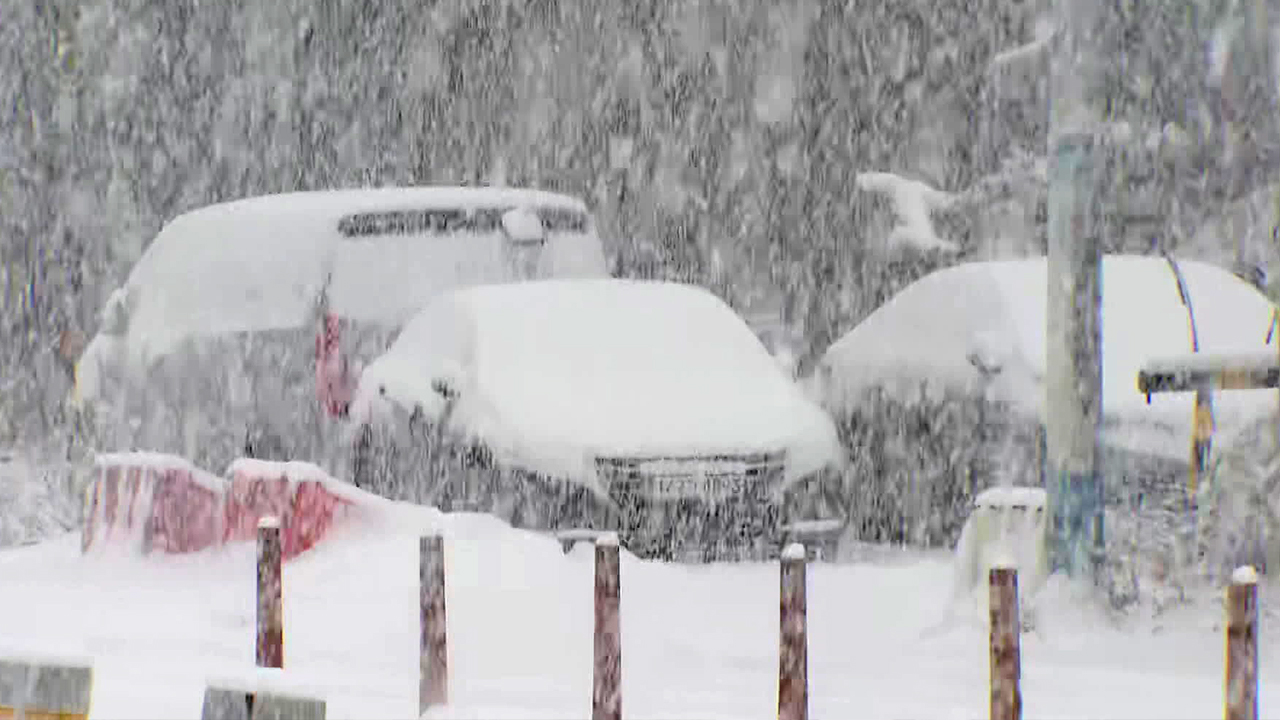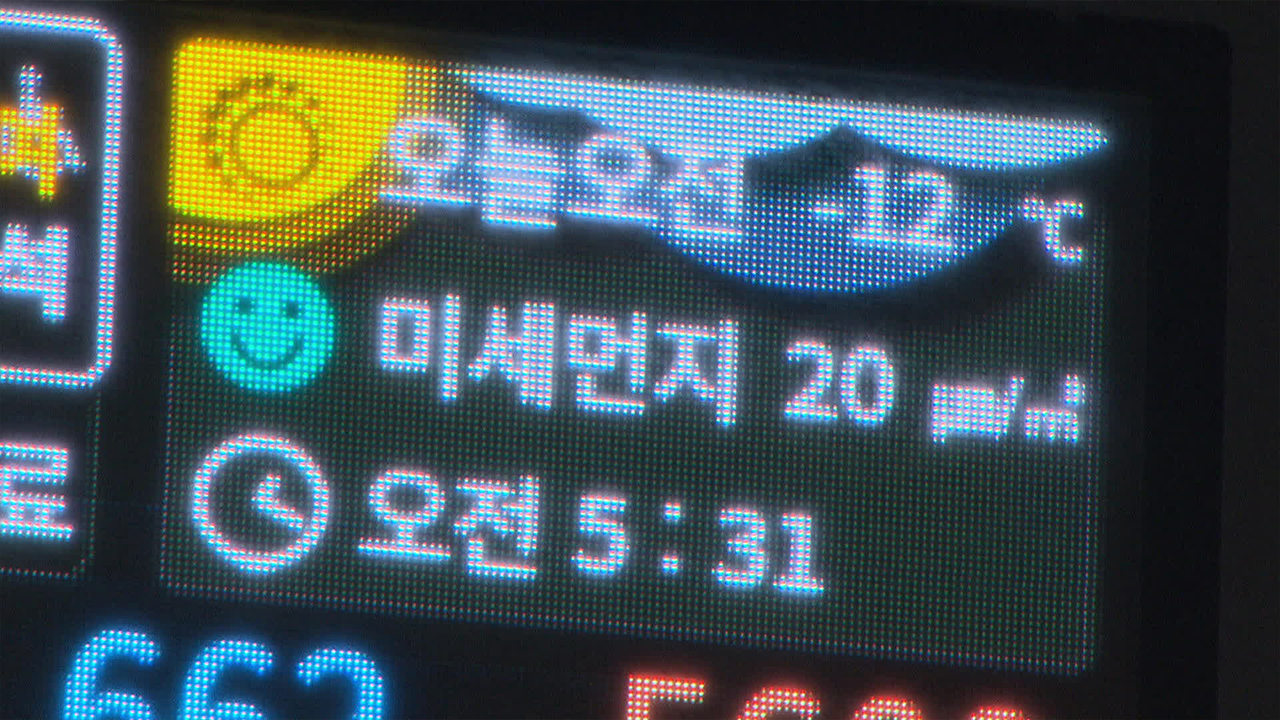[Anchor]
We will look into the causes of the cold wave and heavy snowfall that have arrived in February.
It can be summarized in three words: global warming.
Our meteorology specialist Shin Bang-sil reports.
[Report]
This winter's weather has been mild.
The average temperature in December of last year was 0.7 degrees higher than normal, and although there was a strong cold wave last month, the average temperature still exceeded the normal level.
However, a long cold wave lasting about a week has been forecasted for February, the end of winter.
A high-pressure system is lingering in the northeast of the Korean Peninsula, while a developed low-pressure system nearby is pulling down Arctic air with temperatures as low as minus 40 degrees.
By the end of this week, a high-pressure system is also expected to settle in the northwest of the Korean Peninsula, continuing this trend.
The Arctic air is passing over the West Sea, which is more than 1 degree warmer than normal, creating strong snow clouds.
As a result, heavy snowfall is continuing, particularly along the west coast.
The background of the Arctic air that has brought the cold wave and heavy snowfall is the warming of the Arctic.
This winter, temperatures in the Arctic are up to 15 degrees higher than normal.
Due to this influence, the jet stream in the upper atmosphere that traps the cold Arctic air is periodically weakening, allowing the cold air to leak toward the Korean Peninsula.
[Yeh Sang-wook/Professor of Marine Convergence Engineering at Hanyang University: "When the Arctic becomes relatively warm, the strength of the east-west flow weakens, creating conditions where the cold air in the Arctic can easily move southward toward the mid-latitudes."]
As the average winter temperature continues to rise, the Arctic cold wave brought on by global warming is becoming a major variable in winter weather.
This is KBS News Shin Bang-sil.
We will look into the causes of the cold wave and heavy snowfall that have arrived in February.
It can be summarized in three words: global warming.
Our meteorology specialist Shin Bang-sil reports.
[Report]
This winter's weather has been mild.
The average temperature in December of last year was 0.7 degrees higher than normal, and although there was a strong cold wave last month, the average temperature still exceeded the normal level.
However, a long cold wave lasting about a week has been forecasted for February, the end of winter.
A high-pressure system is lingering in the northeast of the Korean Peninsula, while a developed low-pressure system nearby is pulling down Arctic air with temperatures as low as minus 40 degrees.
By the end of this week, a high-pressure system is also expected to settle in the northwest of the Korean Peninsula, continuing this trend.
The Arctic air is passing over the West Sea, which is more than 1 degree warmer than normal, creating strong snow clouds.
As a result, heavy snowfall is continuing, particularly along the west coast.
The background of the Arctic air that has brought the cold wave and heavy snowfall is the warming of the Arctic.
This winter, temperatures in the Arctic are up to 15 degrees higher than normal.
Due to this influence, the jet stream in the upper atmosphere that traps the cold Arctic air is periodically weakening, allowing the cold air to leak toward the Korean Peninsula.
[Yeh Sang-wook/Professor of Marine Convergence Engineering at Hanyang University: "When the Arctic becomes relatively warm, the strength of the east-west flow weakens, creating conditions where the cold air in the Arctic can easily move southward toward the mid-latitudes."]
As the average winter temperature continues to rise, the Arctic cold wave brought on by global warming is becoming a major variable in winter weather.
This is KBS News Shin Bang-sil.
■ 제보하기
▷ 카카오톡 : 'KBS제보' 검색, 채널 추가
▷ 전화 : 02-781-1234, 4444
▷ 이메일 : kbs1234@kbs.co.kr
▷ 유튜브, 네이버, 카카오에서도 KBS뉴스를 구독해주세요!
- Global warming brings harsh winter
-
- 입력 2025-02-04 23:57:51

[Anchor]
We will look into the causes of the cold wave and heavy snowfall that have arrived in February.
It can be summarized in three words: global warming.
Our meteorology specialist Shin Bang-sil reports.
[Report]
This winter's weather has been mild.
The average temperature in December of last year was 0.7 degrees higher than normal, and although there was a strong cold wave last month, the average temperature still exceeded the normal level.
However, a long cold wave lasting about a week has been forecasted for February, the end of winter.
A high-pressure system is lingering in the northeast of the Korean Peninsula, while a developed low-pressure system nearby is pulling down Arctic air with temperatures as low as minus 40 degrees.
By the end of this week, a high-pressure system is also expected to settle in the northwest of the Korean Peninsula, continuing this trend.
The Arctic air is passing over the West Sea, which is more than 1 degree warmer than normal, creating strong snow clouds.
As a result, heavy snowfall is continuing, particularly along the west coast.
The background of the Arctic air that has brought the cold wave and heavy snowfall is the warming of the Arctic.
This winter, temperatures in the Arctic are up to 15 degrees higher than normal.
Due to this influence, the jet stream in the upper atmosphere that traps the cold Arctic air is periodically weakening, allowing the cold air to leak toward the Korean Peninsula.
[Yeh Sang-wook/Professor of Marine Convergence Engineering at Hanyang University: "When the Arctic becomes relatively warm, the strength of the east-west flow weakens, creating conditions where the cold air in the Arctic can easily move southward toward the mid-latitudes."]
As the average winter temperature continues to rise, the Arctic cold wave brought on by global warming is becoming a major variable in winter weather.
This is KBS News Shin Bang-sil.
We will look into the causes of the cold wave and heavy snowfall that have arrived in February.
It can be summarized in three words: global warming.
Our meteorology specialist Shin Bang-sil reports.
[Report]
This winter's weather has been mild.
The average temperature in December of last year was 0.7 degrees higher than normal, and although there was a strong cold wave last month, the average temperature still exceeded the normal level.
However, a long cold wave lasting about a week has been forecasted for February, the end of winter.
A high-pressure system is lingering in the northeast of the Korean Peninsula, while a developed low-pressure system nearby is pulling down Arctic air with temperatures as low as minus 40 degrees.
By the end of this week, a high-pressure system is also expected to settle in the northwest of the Korean Peninsula, continuing this trend.
The Arctic air is passing over the West Sea, which is more than 1 degree warmer than normal, creating strong snow clouds.
As a result, heavy snowfall is continuing, particularly along the west coast.
The background of the Arctic air that has brought the cold wave and heavy snowfall is the warming of the Arctic.
This winter, temperatures in the Arctic are up to 15 degrees higher than normal.
Due to this influence, the jet stream in the upper atmosphere that traps the cold Arctic air is periodically weakening, allowing the cold air to leak toward the Korean Peninsula.
[Yeh Sang-wook/Professor of Marine Convergence Engineering at Hanyang University: "When the Arctic becomes relatively warm, the strength of the east-west flow weakens, creating conditions where the cold air in the Arctic can easily move southward toward the mid-latitudes."]
As the average winter temperature continues to rise, the Arctic cold wave brought on by global warming is becoming a major variable in winter weather.
This is KBS News Shin Bang-sil.
-
-

신방실 기자 weezer@kbs.co.kr
신방실 기자의 기사 모음
-
이 기사가 좋으셨다면
-
좋아요
0
-
응원해요
0
-
후속 원해요
0















이 기사에 대한 의견을 남겨주세요.